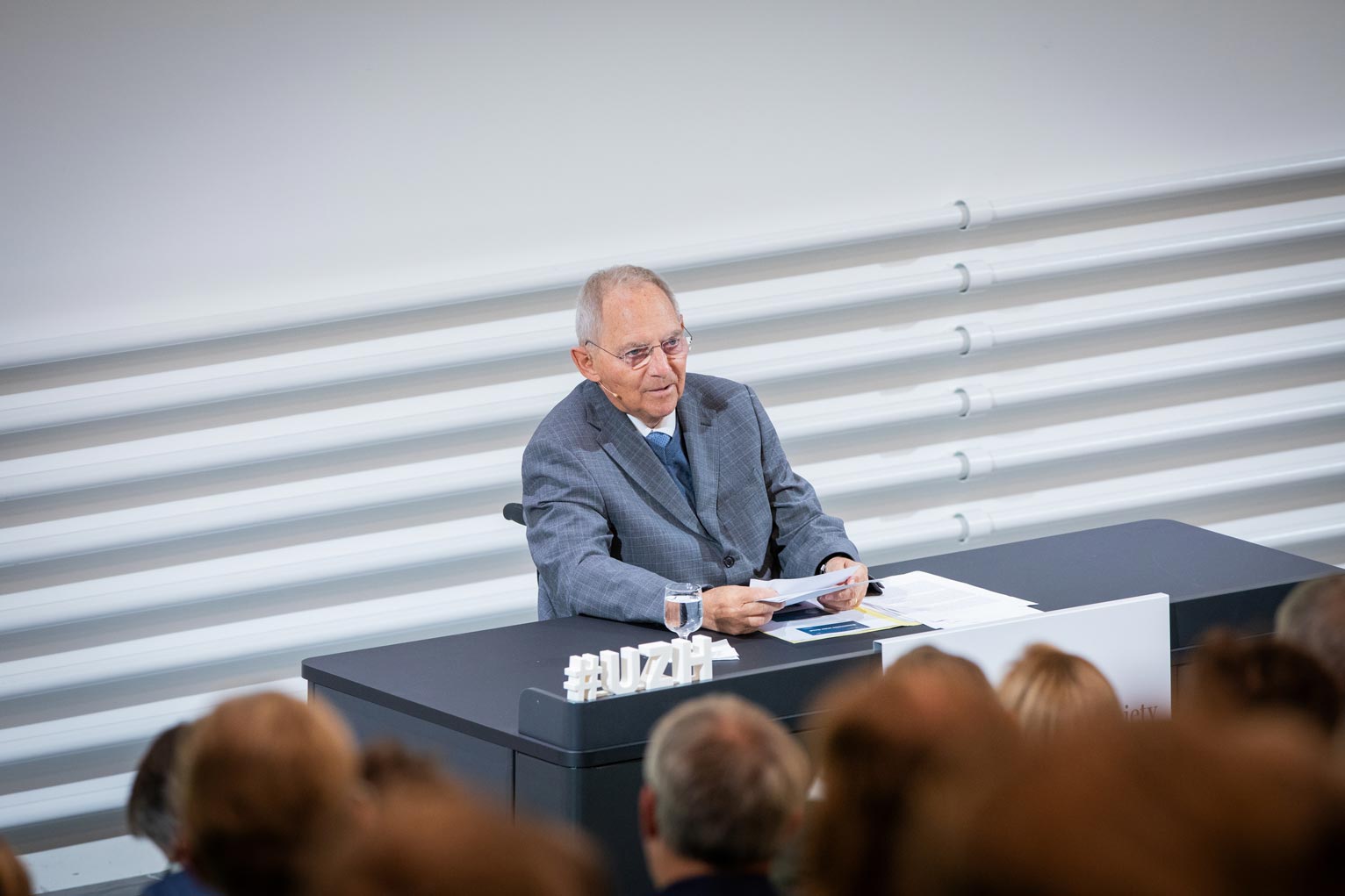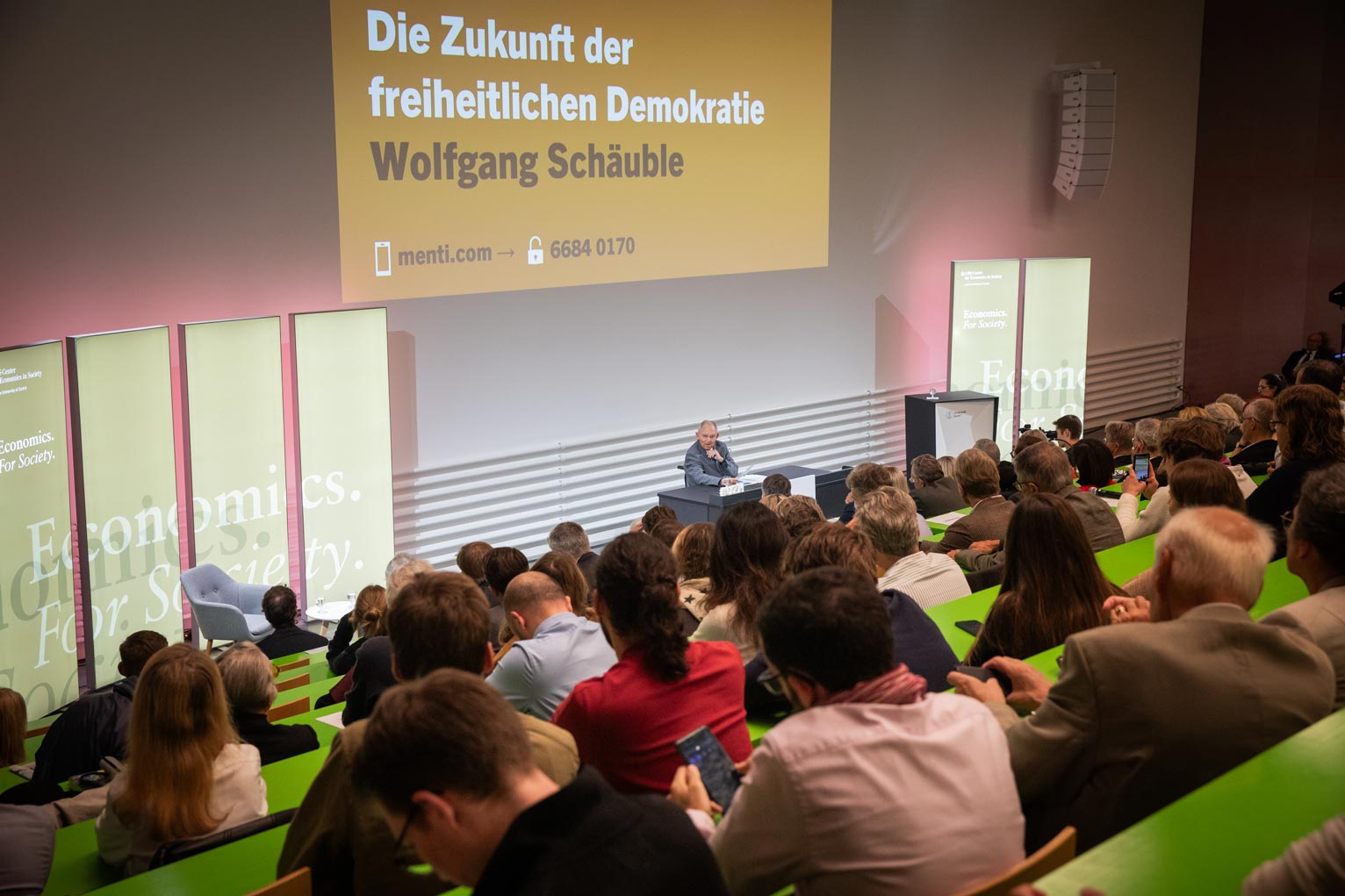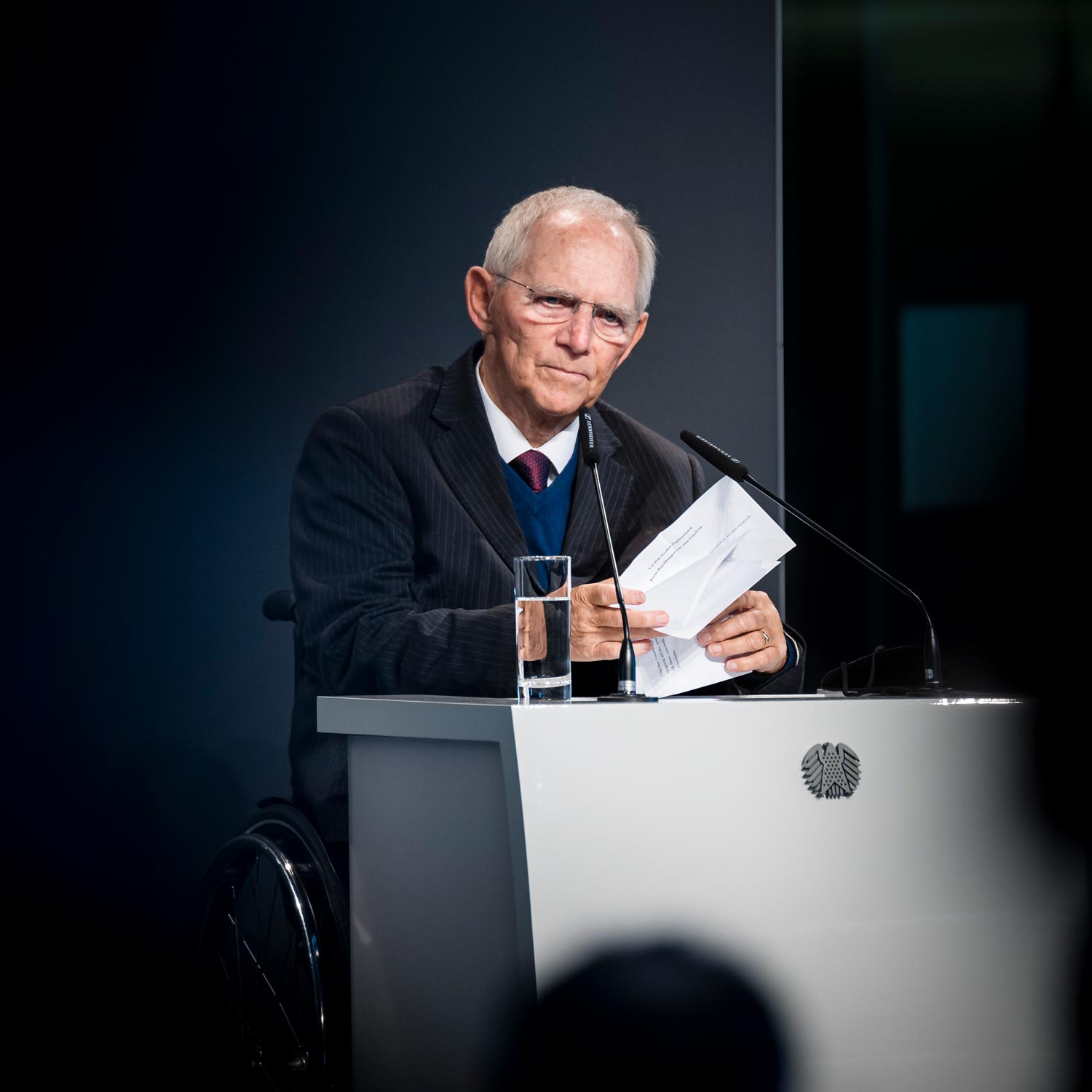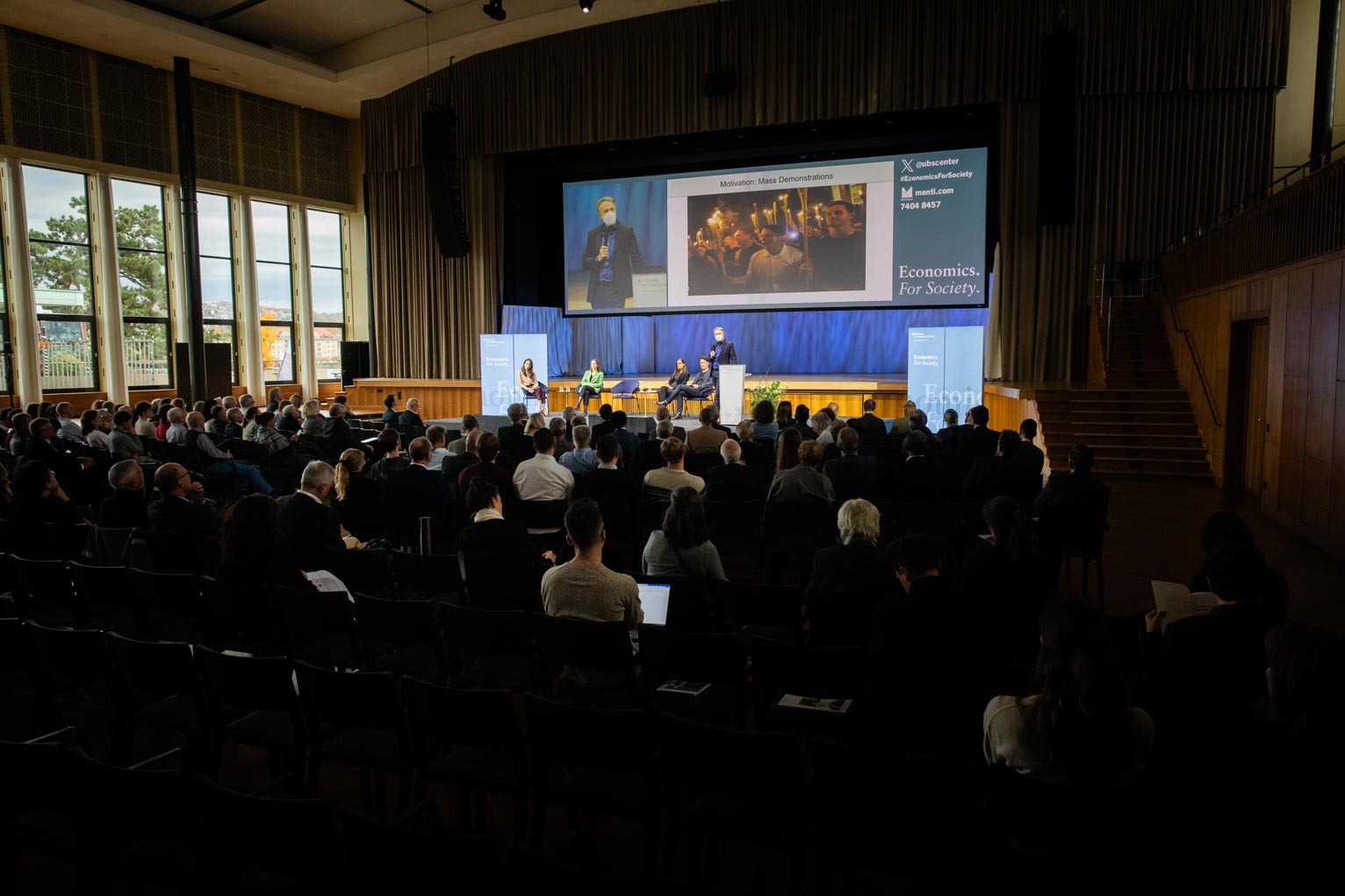Wolfgang Schäuble at UZH
The CDU politician Wolfgang Schäuble spoke at the University of Zurich about the future of free democracy. In his speech, he painted a cautiously optimistic picture, peppered with anecdotes and quotes from his impressive political career.
This article by Maura Wyler was originally published in UZH News on 26.10.2023. Translated and edited for layout purposes by the UBS Center.
The ongoing Russian war of aggression against Ukraine and the reignited war in Israel – two recent events that were unthinkable in 1989 after the end of the Cold War and the East-West conflict. Little remains of the triumph of free democracy under the rule of law. With this sobering assessment of current developments, Wolfgang Schäuble opened his speech at the UBS Center for Economics in Society at the University of Zurich, admitting: “We could have seen a lot coming.”
The CDU politician and former president of the German Bundestag quoted Polish President Lech Kaczynski as saying after Russia’s invasion of Georgia in 2008: “First Georgia, then Ukraine, then Moldova and then the Baltic States, and then Poland.” But who in Western Europe wanted to hear that at the time? Economic sanctions had been imposed on Russia, but the supply of oil and gas had even been increasing, Schäuble noted. Growing dependence, however, meant extortion, which had been overlooked at the time.
The CDU politician Wolfgang Schäuble spoke at the University of Zurich about the future of free democracy. In his speech, he painted a cautiously optimistic picture, peppered with anecdotes and quotes from his impressive political career.
This article by Maura Wyler was originally published in UZH News on 26.10.2023. Translated and edited for layout purposes by the UBS Center.
The ongoing Russian war of aggression against Ukraine and the reignited war in Israel – two recent events that were unthinkable in 1989 after the end of the Cold War and the East-West conflict. Little remains of the triumph of free democracy under the rule of law. With this sobering assessment of current developments, Wolfgang Schäuble opened his speech at the UBS Center for Economics in Society at the University of Zurich, admitting: “We could have seen a lot coming.”

Global responses
“The war in Ukraine is directed against our values, which is why we support Ukraine out of a well-understood self-interest,” Schäuble continued. In doing so, he moved on to a classification of the current world situation, which, he noted, is characterized by a turning point with changed global power and influence structures. For him, it is clear that the pressing problems require global responses. He referred not only to threats to security and peace caused by acts of war and terrorism, but also to other threats, such as climate change, increased economic and political interdependence, and new forms of cyberwars.
“The war in Ukraine is directed against our values, which is why we support Ukraine out of a well-understood self-interest,” Schäuble continued. In doing so, he moved on to a classification of the current world situation, which, he noted, is characterized by a turning point with changed global power and influence structures. For him, it is clear that the pressing problems require global responses. He referred not only to threats to security and peace caused by acts of war and terrorism, but also to other threats, such as climate change, increased economic and political interdependence, and new forms of cyberwars.
Extent and center
Are our Western value-based systems still efficient enough to compete globally? How can Europe compete with China, which is compelling in its innovation and dynamism, while Germany’s infrastructure projects have lagged behind for decades? Schäuble’s answer to which course we need to take in Europe seems clear at first glance: it needs measure and mediate, as any form of exaggeration in any direction is the real problem. This applies to the social market economy, which lies in the middle between a pure capitalist market economy on the one hand and state dirigisme under socialist levelling on the other; furthermore, it extends to politics and the media.
At second glance, Schäuble also acknowledged difficulties in implementation. He pointed to some problematic patterns of behavior and dilemmas of human order. For example, the status quo preference, which prevents us from initiating important changes for as long as we are doing well. However, Schäuble sees an opportunity in the current crises, “because crises and crisis awareness create a willingness to change.”
Are our Western value-based systems still efficient enough to compete globally? How can Europe compete with China, which is compelling in its innovation and dynamism, while Germany’s infrastructure projects have lagged behind for decades? Schäuble’s answer to which course we need to take in Europe seems clear at first glance: it needs measure and mediate, as any form of exaggeration in any direction is the real problem. This applies to the social market economy, which lies in the middle between a pure capitalist market economy on the one hand and state dirigisme under socialist levelling on the other; furthermore, it extends to politics and the media.
At second glance, Schäuble also acknowledged difficulties in implementation. He pointed to some problematic patterns of behavior and dilemmas of human order. For example, the status quo preference, which prevents us from initiating important changes for as long as we are doing well. However, Schäuble sees an opportunity in the current crises, “because crises and crisis awareness create a willingness to change.”

Confidence in Europe
In principle, Schäuble looks forward to the future with confidence. He made this clear by reference to two developments in Germany: first, the massive supply of weapons by the Germans to Ukraine, which Germany was able to agree to after long hesitation and internal differences, and second, the looming, more realistic view of the migration and integration problems. Both points out that “problem pressures also force change.”
In the rest of Europe, Schäuble hopes for similar developments. For him, it is clear that Europe must build up a stronger defense capability given the uncertain domestic political developments in the United States: “In this respect, I see France, Poland, and Germany as leaders – Poland with the only large and operational conventional army, France with its nuclear capabilities, whose protected area should be the whole of Europe.��”
Schäuble put the frequently expressed fear of Chinese or Russian domination into perspective. Contrary to almost everyone’s expectations, Russia is unlikely to be able to defeat Ukraine. In China, on the one hand, the dream of a new Silk Road is disappearing, and on the other, the great power is facing headwinds from the BRICS countries, which have made it abundantly clear that they do not want to replace Western domination with Chinese. There is thus still hope, according to Schäuble. Liberal democracy faces challenges, but “the future of liberal democracy is in our own hands.”
In principle, Schäuble looks forward to the future with confidence. He made this clear by reference to two developments in Germany: first, the massive supply of weapons by the Germans to Ukraine, which Germany was able to agree to after long hesitation and internal differences, and second, the looming, more realistic view of the migration and integration problems. Both points out that “problem pressures also force change.”
In the rest of Europe, Schäuble hopes for similar developments. For him, it is clear that Europe must build up a stronger defense capability given the uncertain domestic political developments in the United States: “In this respect, I see France, Poland, and Germany as leaders – Poland with the only large and operational conventional army, France with its nuclear capabilities, whose protected area should be the whole of Europe.”
About the person
Wolfgang Schäuble was a German CDU politician, former Finance Minister, and the longest-serving member of the German Bundestag. Since taking office in 1972 until his death in 2023, he has shaped German politics in a number of high-ranking posts. Among other things, he led the negotiations for the reunification of the Federal Republic of Germany. He has received numerous prestigious prizes and honors for his work, including the Konrad Adenauer Peace Prize in 1998.
Wolfgang Schäuble was a German CDU politician, former Finance Minister, and the longest-serving member of the German Bundestag. Since taking office in 1972 until his death in 2023, he has shaped German politics in a number of high-ranking posts. Among other things, he led the negotiations for the reunification of the Federal Republic of Germany. He has received numerous prestigious prizes and honors for his work, including the Konrad Adenauer Peace Prize in 1998.

Democracies under threat
Wolfgang Schäuble’s lecture was the kick-off of a three-part series of events organized by the UBS Center for Economics in Society under the theme Democracies under threat. Steven Pinker’s lecture followed at the University of Zurich on 7 November. The psychologist and bestselling author talked about rationality and its significance for liberal democracy. The highlight of the series was the annual Forum for Economic Dialogue on 13 November at the Kongresshaus Zürich, where the topic Democracies under threat was examined and discussed with Nobel Prize laureate Herta Müller, democracy experts Jason Brennan and Daniel Ziblatt, and many other speakers.
Wolfgang Schäuble’s lecture was the kick-off of a three-part series of events organized by the UBS Center for Economics in Society under the theme Democracies under threat. Steven Pinker’s lecture followed at the University of Zurich on 7 November. The psychologist and bestselling author talked about rationality and its significance for liberal democracy. The highlight of the series was the annual Forum for Economic Dialogue on 13 November at the Kongresshaus Zürich, where the topic Democracies under threat was examined and discussed with Nobel Prize laureate Herta Müller, democracy experts Jason Brennan and Daniel Ziblatt, and many other speakers.
